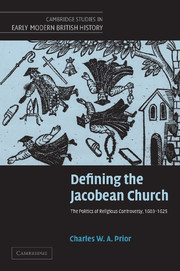Book contents
- Frontmatter
- Contents
- Acknowledgements
- Note on the text
- 1 Introduction: defining the Church
- 2 The language of ecclesiastical polity and Jacobean conformist thought
- 3 Doctrine, law, and conflict over the Canons of 1604
- 4 Apostoli, episcopi, divini?: models of ecclesiastical governance
- 5 Bellum ceremoniale: scripture, custom, and ceremonial practice
- 6 Ceremonies, episcopacy, and the Scottish Kirk
- 7 Conclusion: narratives of civil and ecclesiastical authority
- Bibliography
- Index
- Titles in the series
5 - Bellum ceremoniale: scripture, custom, and ceremonial practice
Published online by Cambridge University Press: 09 July 2009
- Frontmatter
- Contents
- Acknowledgements
- Note on the text
- 1 Introduction: defining the Church
- 2 The language of ecclesiastical polity and Jacobean conformist thought
- 3 Doctrine, law, and conflict over the Canons of 1604
- 4 Apostoli, episcopi, divini?: models of ecclesiastical governance
- 5 Bellum ceremoniale: scripture, custom, and ceremonial practice
- 6 Ceremonies, episcopacy, and the Scottish Kirk
- 7 Conclusion: narratives of civil and ecclesiastical authority
- Bibliography
- Index
- Titles in the series
Summary
As was the case with episcopacy, the evidence of scripture and the history of the early church were central to both defences and criticisms of ceremonial practice. Conformists sought to differentiate between the ceremonies of the English Church and the ceremonies described in scripture and the history of early Christianity. In addition to arguing that there was no necessary link between the two, they suggested that the Church held the power to establish ceremonial practices it deemed edifying, but yet were adiaphora. These arguments defined a church based partly in scripture and partly on ‘custom’ and the example of history; the Church was partly spiritual and partly temporal, and in its temporal aspect it could be shaped by the design of human agents. Reformists promoted a view of an institution derived from scripture and emulating it perfectly in all forms of rites and governance – a spiritual association. Hence, they stressed the perfection of the ‘first institution’ – the church established by Christ and handed to the Apostles. Writers like Henry Ainsworth condemned their opponents for reproaching ‘the faith and witnesses’ of the true church, and sought reform governed by its example. They maintained that the ceremonial practice of the English Church should be based on that described in scripture, and confirmed by the practice of the Apostolic church. Clearly, then, the reformist stance on ceremonial practice was rooted in a firm sense of historical understanding.
- Type
- Chapter
- Information
- Defining the Jacobean ChurchThe Politics of Religious Controversy, 1603–1625, pp. 158 - 203Publisher: Cambridge University PressPrint publication year: 2005

